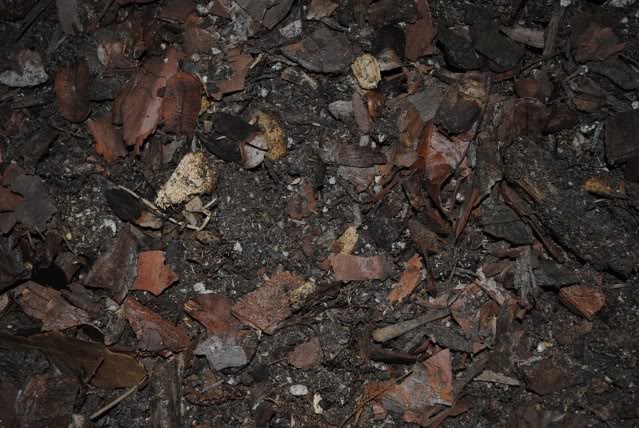| Author |
Message |
John Bonzo
Citruholic

Joined: 14 Jul 2009
Posts: 133
Location: Houston, TX
|
| Posted: Fri 02 Jul, 2010 12:08 am |
|
For some reason I just have a thing against buying potting "soil." I guess I would just prefer to spend money on trees or tools or other things. However, I am beginning to grow some small tropicals in pots as well as citrus seedlings, so I have a growing need for some potting soil.
There is a dead rotting black walnut tree at my grandfather's house, so I used some of the completely decomposed walnut tree and added on pine bark and pine cone pieces from an endless supply at my house. I have never heard of anyone using pine cones in potting mix, but when you break the pieces off the cone it seems to be the perfect size (Loblolly Pines at least). I did a rough 50% decomposed walnut/50% pine bark and pine cone mix.
Here is my 100% free potting soil result:

(with the pine bark pieces to the left of the pot)

I did have about 3 cups of potting soil left in an old bag that I had forgotten about, which I hastily mixed in on top, hence the few pieces of vermiculite on top.
Hopefully this will prove to be a good mix with little compaction and good, fast drainage. |
|
| Back to top |
|
 |
Millet
Citruholic


Joined: 13 Nov 2005
Posts: 6656
Location: Colorado
|
| Posted: Fri 02 Jul, 2010 1:34 am |
|
John, it is not a good idea to use Black Walnut as an ingredient in your potting mixture. Black Walnut trees produce a toxic substance that kills many types of trees and plants. Black Walnut is never used in potting soils, seed starter mixtures, or mediums intended for growing many types of trees. This is due to a toxic chemical produced by the tree called Juglone. Juglone, which occurs naturally in all parts of the Black Walnut tree is a respiration inhibitor, which deprives sensitive plants of needed energy for metabolic activity. The largest toxic concentrations of Juglone and hydrojuglone occur in the walnut's buds, nut hulls and roots. However, leaves and stems also contain smaller quantities. The symptoms of Juglone toxicity first shows up as yellowing of leaves, followed by wilting, and finally death. Not all plants are sensitive to the same degree to Juglone. As to the degree of sensitivity of citrus, I don't have any idea, but I certainly would never recommend the use of Black Walnut in any growth medium Sorry for the bad news. Take care. - Millet (929-) |
|
| Back to top |
|
 |
John Bonzo
Citruholic

Joined: 14 Jul 2009
Posts: 133
Location: Houston, TX
|
| Posted: Fri 02 Jul, 2010 2:46 am |
|
Thanks for the reply. Now that you mention it, that does ring a bell.
How long does Juglone last through the decomposition process? This tree is at least 3 years removed from being alive. I have used this decomposed black walnut this year in raised beds and had the best tomato crop in 5 years, which is funny because I now read that tomatoes are on of the most sensitive plants to Juglone. |
|
| Back to top |
|
 |
Millet
Citruholic


Joined: 13 Nov 2005
Posts: 6656
Location: Colorado
|
| Posted: Fri 02 Jul, 2010 3:13 am |
|
Yes, your correct. Of all plants, tomatoes are one of the most sensitive, thus they are the easiest to be killed. I have no idea, how long Juglone can remain in the remnants of an old Black Walnut tree, or even if it does. Just thought you would like to know of the possible problems that can result. - Millet (928-) |
|
| Back to top |
|
 |
Sylvain
Site Admin


Joined: 16 Nov 2007
Posts: 790
Location: Bergerac, France.
|
| Posted: Sun 04 Jul, 2010 5:52 am |
|
If I remember well juglone is mainly a germination inhibitor. An established plant can overcome the toxicity. |
|
| Back to top |
|
 |
John Bonzo
Citruholic

Joined: 14 Jul 2009
Posts: 133
Location: Houston, TX
|
| Posted: Sun 04 Jul, 2010 3:02 pm |
|
The tomatoes that grew well in it were transplants. I am going to throw some trifoliate orange seeds in it and see if there are any problems with germination. |
|
| Back to top |
|
 |
Skeeter
Moderator

Joined: 23 Jul 2006
Posts: 2218
Location: Pensacola, FL zone 9
|
| Posted: Sun 04 Jul, 2010 10:02 pm |
|
Your pine bark chunks look about like the size I use--but I use about 4 to 1 bark to peat moss.
_________________
Skeet
 |
|
| Back to top |
|
 |
John Bonzo
Citruholic

Joined: 14 Jul 2009
Posts: 133
Location: Houston, TX
|
| Posted: Wed 07 Jul, 2010 12:11 pm |
|
So far there has been no germination on the trifoliate orange seeds planted in the black walnut, but it has only been a few days.
| Skeeter wrote: | | Your pine bark chunks look about like the size I use--but I use about 4 to 1 bark to peat moss. |
With the 4 to 1 ratio, do you have to water daily in the summer?
How do you break up the bark? I just used garden clippers to cut it up in pieces, but it takes a while. |
|
| Back to top |
|
 |
Skeeter
Moderator

Joined: 23 Jul 2006
Posts: 2218
Location: Pensacola, FL zone 9
|
| Posted: Wed 07 Jul, 2010 8:15 pm |
|
I do not have to water daily, 3-4 days when it is really hot--once a week or less in winter. I break mine up by hand (wearing gloves--it can cut you).
_________________
Skeet
 |
|
| Back to top |
|
 |
John Bonzo
Citruholic

Joined: 14 Jul 2009
Posts: 133
Location: Houston, TX
|
| Posted: Tue 30 Nov, 2010 12:14 am |
|
I just want to update this to share that the trifoliate seeds germinated with no trouble and are doing fine at the moment. I guess either the toxicity broke down in the composting process, poncirus is not that sensitive to it, or both. Thanks for the info! |
|
| Back to top |
|
 |
C4F
Citruholic

Joined: 12 Feb 2010
Posts: 139
Location: San Joaquin Valley, CA
|
| Posted: Mon 06 Dec, 2010 9:34 pm |
|
John, I appreciate you coming back and updating. That's always helpful. Maybe do it again in a year! |
|
| Back to top |
|
 |
Darkman
Citruholic

Joined: 20 Jul 2010
Posts: 968
Location: Pensacola Florida South of I-10 Zone 8b/9a
|
| Posted: Tue 07 Dec, 2010 1:49 am |
|
| C4F wrote: | | John, I appreciate you coming back and updating. That's always helpful. Maybe do it again in a year! |
Ditto Thanks
_________________
Charles in Pensacola
Life - Some assembly required, As is no warranty, Batteries not included, Instructions shipped separately and are frequently wrong!
Kentucky Bourbon - It may not solve the problem but it helps to make it tolerable! |
|
| Back to top |
|
 |








